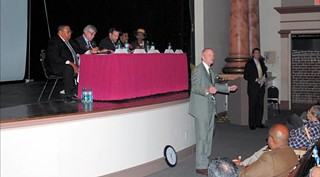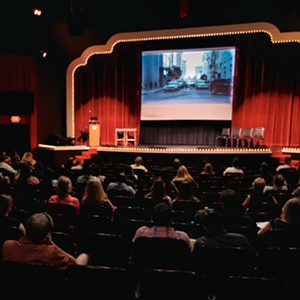Savannah’s mayoral candidates covered much political ground at a forum at the Visitor’s Center Sept. 20, revealing some of the positions they’ll stake out in order to differentiate themselves from the rest of the crowded field.
Five of the six registered candidates sat onstage at the event co–sponsored by the Downtown Neighborhood Association and Historic Savannah Foundation. (Where was the sixth? More on that later.)
The forum, moderated by DNA president Hank Reed and HSF President Daniel Carey, focused on quality of life issues in downtown neighborhoods as well as topics that affect broader Savannah, like jobs creation, LNG trucks and handling a projected $2.3 million budget surplus.
Many in attendance were members of one or both organizations, and the first questions gave the candidates an opportunity to win over those downtown residents by addressing the increase in complaints about reduced maintenance on the squares, idling buses and tourists trampling landscaping.
“We put some parameters in place many years ago, but I don’t know what happened,” said Floyd Adams, who served as mayor of Savannah from 1996 to 2004 and created the Tourism Advisory Council to enforce restrictions on commercial tour companies and report public space issues.
“The squares look terrible. As your mayor, I would re–install those programs.”
Tourism is the city’s cash cow, and restoring the delicate balance between Savannah’s visitors and the downtown residents who pay property taxes will surely be a high priority for the next mayor — though one candidate wondered why it hadn’t been of first concern of the current one and his council.
“After eight years of the current administration, eight of the former administration, you’re still having these problems?” asked Regina Thomas. “We need a round–up review and revision of the tourist ordinance. It was written when we had a few million tourists; now we have over eleven million annually,” she said, citing what some think are optimistic figures from the local Convention and Visitors Bureau.
“We can’t do the same things over and over again and expect different results,” said Thomas.
A former state senator, Thomas reiterated the message throughout the forum that she is the only candidate who hasn’t served on city council in the past 16 years, implying that everyone else onstage has had plenty of opportunity to fix ongoing problems but haven’t succeeded.
All were in agreement that while upkeep of the landmark historic district and other surrounding historic districts is a priority for the city, blight caused by boarded up houses and “demolition by neglect” will be a challenge.
Jeff Felser, an alderman–at–large for two terms, reminded the audience he voted for incentives to inspire owners to rehab properties and also came up with a rodent abatement program for a Westside neighborhood.
For advice concerning downtown’s many dilapidated houses, current mayor pro–tem Edna Jackson promised to ask the audience for solutions.
“You may have some of the answers about what we need to do. Council members cannot have all the answers. I’ll be looking for suggestions from you.”
In a clear reference to last year’s city manager debacle, the moderators wanted to know how the candidates would go about hiring a new city manager should the occasion arise.
Thomas referred to the botched search and subsequent controversy as a “fiasco.”
Ellis Cook said it was “one of the most divisive things that has ever happened in the city of Savannah.”
In order to prevent another boondoggle, Cook said he’ll call for new legislation that would allow the city to hire only an acting city manager if the term of the current administration is less than two years.
When it comes to job creation, candidates spoke of partnerships with industry and existing organizations and increased education.
“If I am elected mayor, I will pull together all of SEDA, the chamber, small businesses, the local school systems and community leaders and we will sit at the table to see where we want Savannah,” said Jackson.
“We have to make sure our students are being trained for the workforce. I think the mayor needs to take lead, but it’s also the responsibility of the leaders I just named.”
Adams advocated going directly to corporations and businesses and asking them what kinds of skills our workers need, as well as investing in infrastructure to attract industry.
Felser laid out a comprehensive call for work force readiness, vocational training and financial literacy. “We have to have graduates who know math, science and reading,” he said. “We have to have incubators for business as well as additional transportation so people can get to work.”
Felser added that “we need to take the ‘kick me’ sign off of businesses in Savannah,” referring to the nasty tangle of a permitting process that local entrepreneurs must navigate in order to open their doors.
On the $2.3 million surplus created by budget redistributions by City Manager Rochelle Small–Toney, that money is only a projection — no one’s ready to write any checks.
Cook said if elected, he’d secure property and possibly have construction underway for a new police headquarters within the first year in office and “put the rest away for a rainy day.”
Felser agreed that it needs to be saved or go towards keeping Savannah safe by way of our police and fire departments.
Jackson suggested spending it in order to fast–track construction projects that would put people to work.
The transportation of liquid natural gas through the city was a unifying point for all the candidates. All agreed that LNG trucks on Savannah’s streets are a bad idea.
Both Felser and Thomas have gone on record with the Federal Energy Regulatory Commission in opposing LNG’s plan to route vehicles full of a material that isn’t flammable as a liquid but can cause explosions that affect a mile–wide radius when ignited in vapor form.
“We’ve got streets that have open holes, potholes, loopholes and sinkholes,” said Thomas. “Can you imagine if one of those trucks has an accident?”
Missing from the stage was candidate James Dewberry, who, though he paid the filing fee to qualify like all the other candidates, wasn’t invited to participate because, according to DNA President Reed, “he has a history of not wanting to keep to the time limits” imposed to ensure that everyone has equal time to speak.
That didn’t stop Dewberry, who also ran in 2007, from attending. Twice he strode to the front of the room to address the crowd of about 120 without a microphone, saying he’d been excluded from what he said was “supposed to be an open forum.”
After a bit of shouting from the audience, candidate Regina Thomas left the stage to speak with Dewberry outside the auditorium. She returned without him a few minutes later and prefaced her response to the next question with a nod to the sixth candidate’s absence.
“My heart is heavy,” said Thomas. “If I had been in the same situation, I would really be hurt.”






























